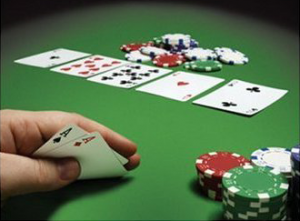
Even if you think this is very true, your intuition may insist that there is a deep divide between emotion and rationality. You may think "Sure, I can even see the arguments about the power of emotions, but the next time I sit down at the poker table, I'll see them as my enemy anyway. That's just the way it is." Let's look at this problem, with the supposed abyss, in more detail.
When we think of emotions as bad, what we really mean when we say emotions are emotions that have a negative impact on good decisions. Obviously, emotions sometimes get in the way and undermine rationality. However, emotions play a complex and multifaceted role in people's lives, and that role does not always preclude rational thinking. Our emotions are not limited to anger, frustration and jealousy. Confidence, enjoyment, playfulness are also part of our emotional make-up and are certainly not harmful emotions.
Neuroscience has taught us that emotions are at the heart of even daily routines and decision-making. There is an experiment called the Iowa gambling task. In it, a participant is shown four pieces of card wood. The subject has to draw one top card from the chosen deck. And depending on which card is drawn, the subject wins or loses his money. This is a game of complete randomness. And the trick is that one of the sticks is secretly tampered with, so the player loses more often.
The experiment reveals that as long as the subject is consciously aware that one of the sticks is counterfeit, even before he is suspicious, he is emotionally repelled from the fake card stick. His hands may tremble or he may experience skin creep when his hand hovers over the fake card wood, so the participant will be inclined to choose other woods. All this happens before the conscious awareness, before the rationality, before the conscious awareness that the cards are being forged. He just subconsciously chooses other cards.
However, if a person with abnormalities in the prefrontal cortex, the central limbic (emotional) system, is chosen, the experiment shows that this participant will continue to choose the counterfeit cards regardless of the outcome. Until the conscious mind realises
the fact that the cards are being tampered with, and sometimes even knowingly so, but they still have difficulty differentiating between the bad and the bad cards.
What does this mean? It means that emotions are inextricably linked to learning and responding to  feedback. The experiment is based on the principle of punishment and reward. A good meal rewards you, a bad one punishes you. But punishment and reward are not calculated by consciousness, they are processed through emotions. In most forms of punishment there is an emotional storm which is much more powerful than a conscious decision. Poker is no exception. If you consistently play badly, one of the main reasons why this behaviour is still continued is the punishment of losing pots. It is your subconscious, emotional system that is constantly being regulated by reward and punishment.
feedback. The experiment is based on the principle of punishment and reward. A good meal rewards you, a bad one punishes you. But punishment and reward are not calculated by consciousness, they are processed through emotions. In most forms of punishment there is an emotional storm which is much more powerful than a conscious decision. Poker is no exception. If you consistently play badly, one of the main reasons why this behaviour is still continued is the punishment of losing pots. It is your subconscious, emotional system that is constantly being regulated by reward and punishment.
Imagine a completely emotionless person, something like an inner zombie. Why would such a person choose winning over losing? There would be no reason for it. Emotions help us to make meaningful decisions in both simple and complex situations. In everyday life, when we talk about emotions, we tend to have only certain emotions in mind (and in poker, mostly negative ones). But in our cognitive life, the meaning of emotions is much more varied and complex than that, and we should take in all this information without simplifying it.
That's why the idea of a "mindless robot" in poker is absurd. Being emotionless would only impair our ability to learn, to respond to the world, and, most importantly, it would make it difficult to protect our well-being. It is just that human beings are trapped in a false perception of what emotions are.
What about poker-playing computer programs that have no emotion and never tilt? Aren't they superior to emotional people? A programme that was programmed to play the same strategy as a human being, without an emotional response, would of course be a superior poker player, but we do not have that option, and we are not playing a theoretical version of poker. The game we are playing is a game played by humans. And in this game, emotions are an integral part of our mental apparatus. Emotions are part of the way we think and learn. We have to learn how to manage ourselves masterfully, within the limits of our inner mind.
So, yes, be as rational as possible. But at the same time, allow yourself to feel emotions. To be a good human poker player, you have to be emotional. You have to feel it when you lose, you have to feel pain when you are outsmarted, you have to have a greedy ego in order to improve and you have to feel good when you succeed. Without these things, poker would be an empty procedure, a cold-blooded ritual, and it would be impossible to build up the energy and determination needed to overcome challenges.





